
Opinions
08:40, 02-Sep-2018
Mutual benefit: Chinese construction contractors and African farmers
Updated
07:41, 05-Sep-2018
Kai Xue
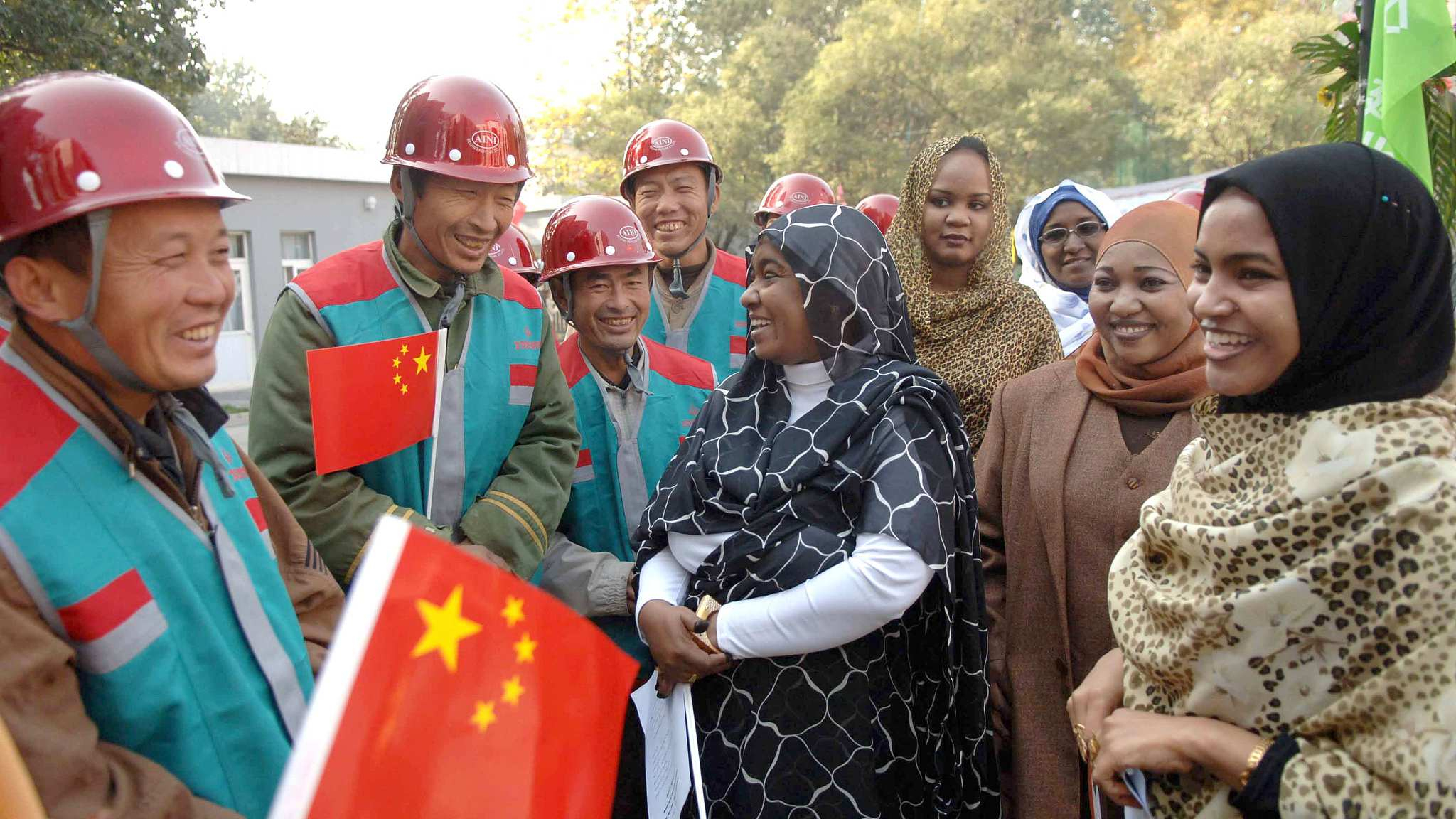
Editor's note: Kai Xue is a corporate lawyer in Beijing. The article reflects the author's opinion, and not necessarily the views of CGTN.
"China builds roads." A Chinese construction contractor at work is often the first image that comes to mind for observers speaking about Sino-African engagement.
The completion of the first Trans-African Highway, stretching over 10,000 km, from Cairo to Cape Town in November 2016, after 3 of the final 4 segments scattered in East Africa were paved by Chinese construction contractors, is a testament to their ubiquitous presence.
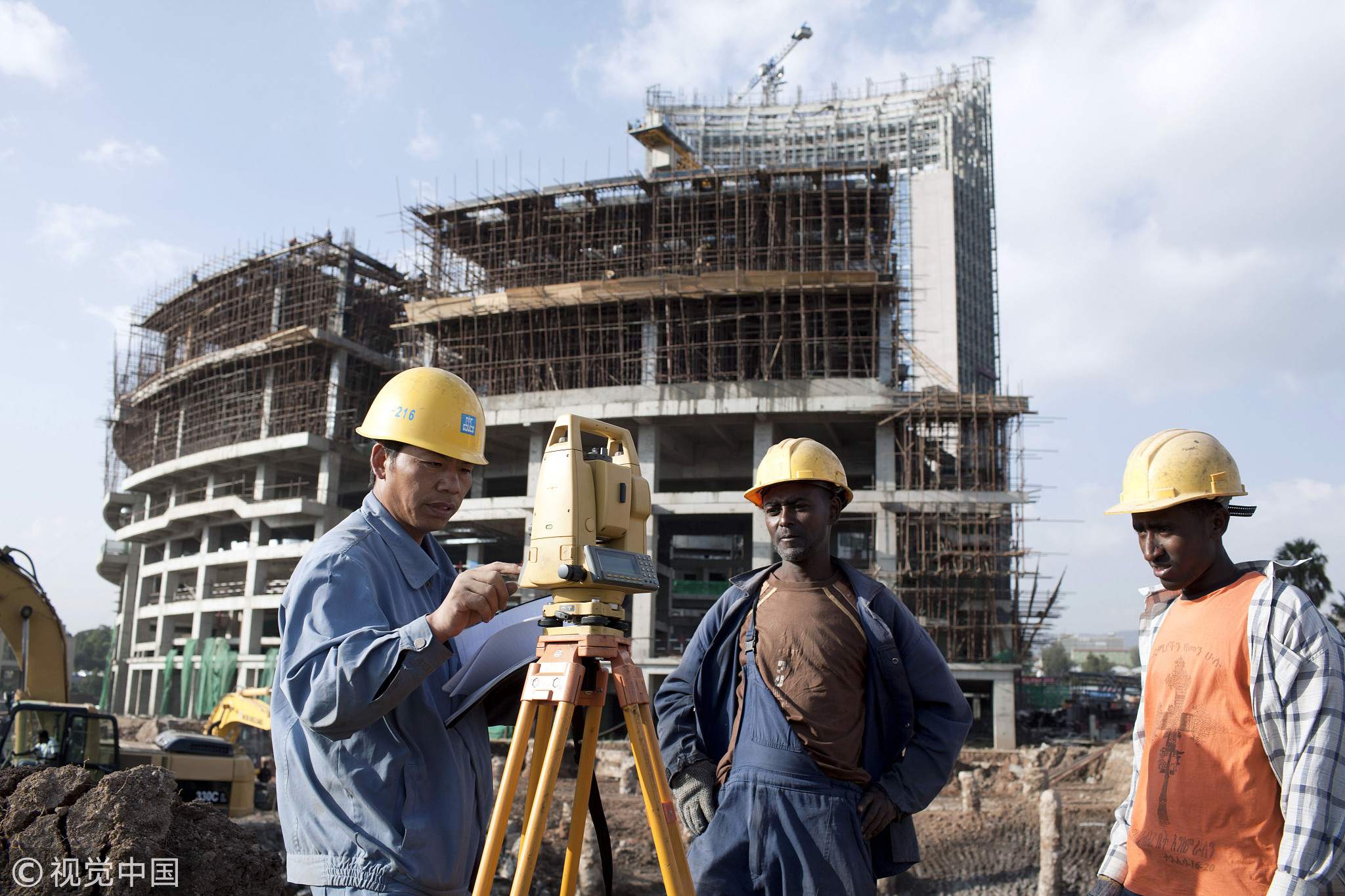
A Chinese construction worker with Ethiopian workers at the new African Union buildings in Addis Ababa, Ethiopia. /VCG Photo.
A Chinese construction worker with Ethiopian workers at the new African Union buildings in Addis Ababa, Ethiopia. /VCG Photo.
The ceremony opening the highway's final segment in Kenya's far north desert was low-key and barely publicized despite the culmination of over a century of planning and working towards a transcontinental road.
Popular Mechanics magazine had written in 1914, "today the Cape-to-Cairo road is nearly half built, and its [completion] is merely a matter of time."
Chinese construction firms in Africa themselves are just as unsung and worthy of being raised from obscurity as their projects.
There is no other group of foreign workers doing more to reshape connectivity and transform the agricultural economy in Africa. They are not only unrecognized but often met with scorn due to a lack of appreciation for the mutual benefit of their work.
Impact on agriculture
Everyone knows that a road benefits a regional economy. But the mechanics are not well understood. The rush of Chinese construction contractors to Africa has given rise to stiff competition in even small markets.
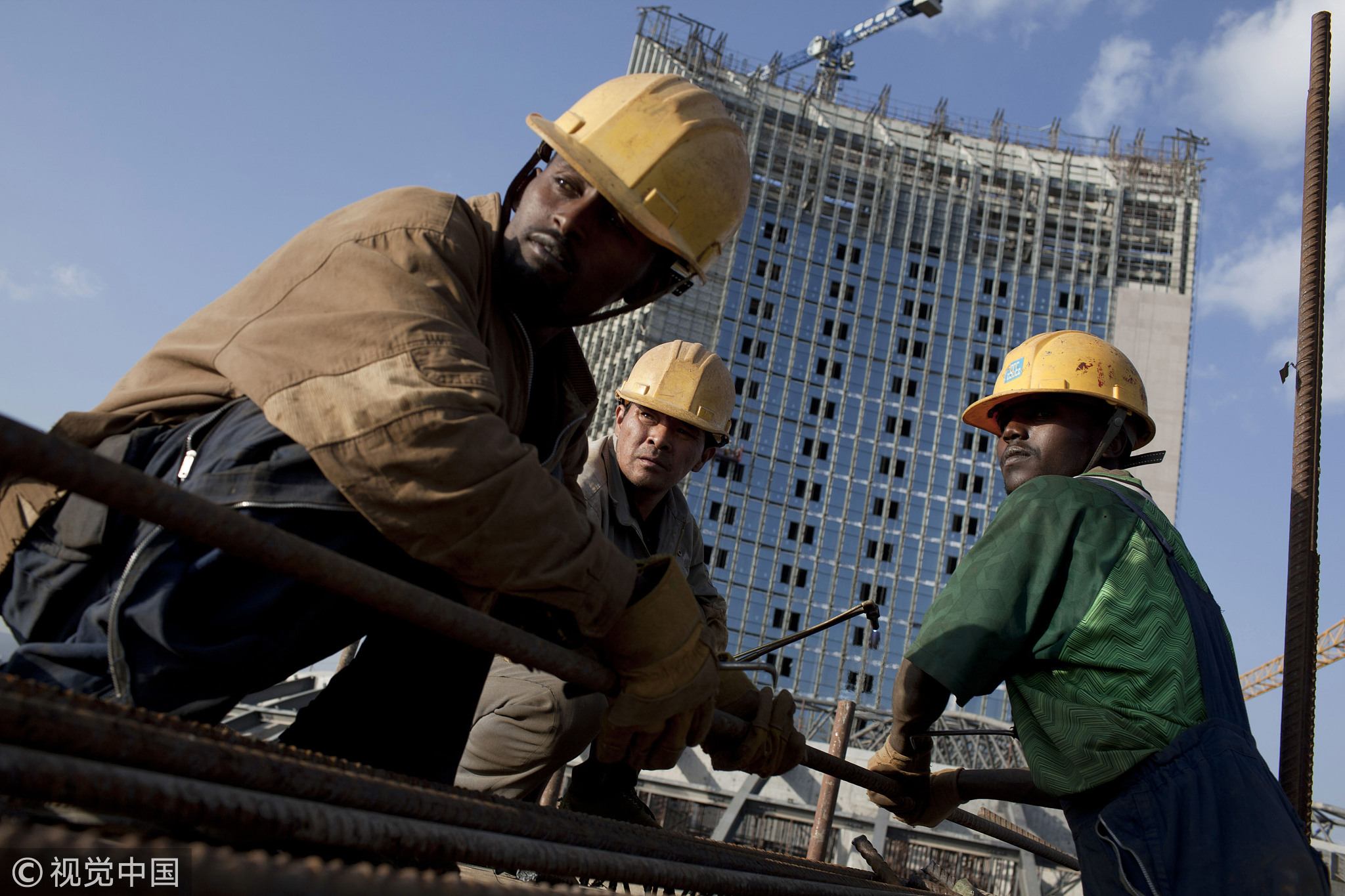
A Chinese construction worker with Ethiopian workers at the new African Union Buildings in Addis Ababa, Ethiopia. /VCG Photo.
A Chinese construction worker with Ethiopian workers at the new African Union Buildings in Addis Ababa, Ethiopia. /VCG Photo.
Prices have fallen. In Uganda, the cost of building a kilometer of road has fallen to 800,000 US dollars, down from 1.2 million US dollars per kilometer when only a few European and American firms bid against each other.
Quality has been maintained. In a paper published by the China Africa Research Initiative -- "How do Chinese Contractors Perform in Africa? Evidence from World Bank Projects" -- Jamie Farrell compared post-completion evaluations in World Bank transportation projects in Africa in the period of 2000-2013 between construction contractors from China versus rich countries and found no difference in the average of quality evaluations.
Cheaper, durable roads mean more roads can be built within the same budget. The impact of roads is central to boosting agricultural productivity, the standard prescription by development economists for uplifting poor economies.
Agriculture's importance tends to be overlooked in development debates in the public sphere because of the high propensity toward seeing new factories as the concrete answer to the need for industrialization.
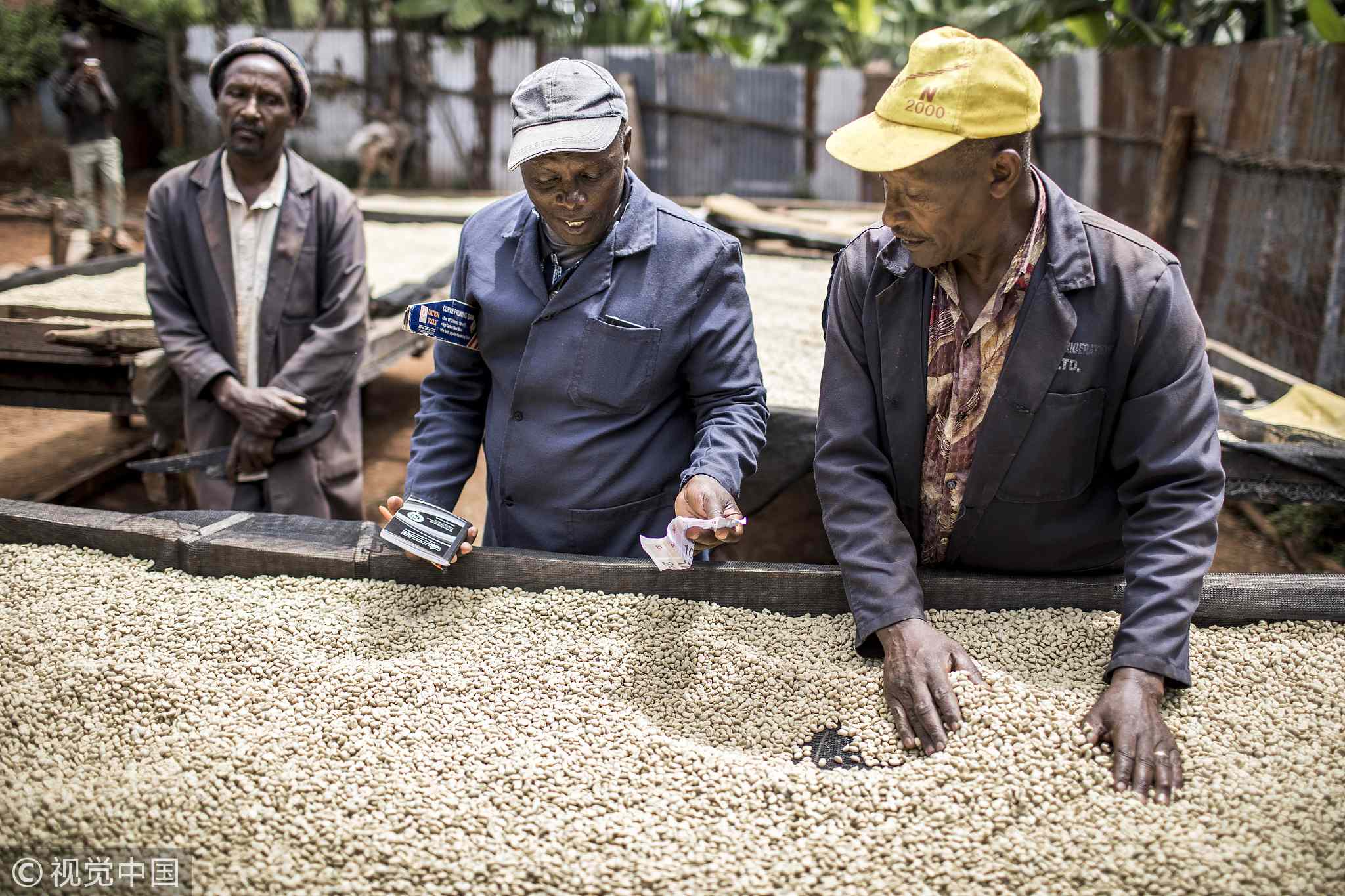
A coffee farmer shows his coffee beans to an agronomist during a coffee harvest at the Ciumenene Estate, Gatundu South, in Kiambu County, Kenya, on Thursday, Dec. 14, 2017. /VCG Photo.
A coffee farmer shows his coffee beans to an agronomist during a coffee harvest at the Ciumenene Estate, Gatundu South, in Kiambu County, Kenya, on Thursday, Dec. 14, 2017. /VCG Photo.
Improving agricultural productivity is a question of meeting the needs of the smallholder family farmer, the backbone of African economies and the majority of households.
Smallholders can grow more if there is a nearby road leading to the city and a loan to buy inputs like fertilizer and seed. Crops travel on a new road to urban customers and fertilizer comes back on the same road from dealerships to farms.
Farm incomes grow and farmers grow more when they are certain of demand and meager government agricultural loans are better utilized with access to more suppliers.
It's why former Prime Minister Meles Zenawi of Ethiopia, an African leader particularly zealous about development through infrastructure, singled out the share of the rural population within 2 km of an all season road as a critical variable in development.
Popular scorn
Despite the synchronization of Chinese construction contractors with grassroots African economic development, local tensions have arisen.
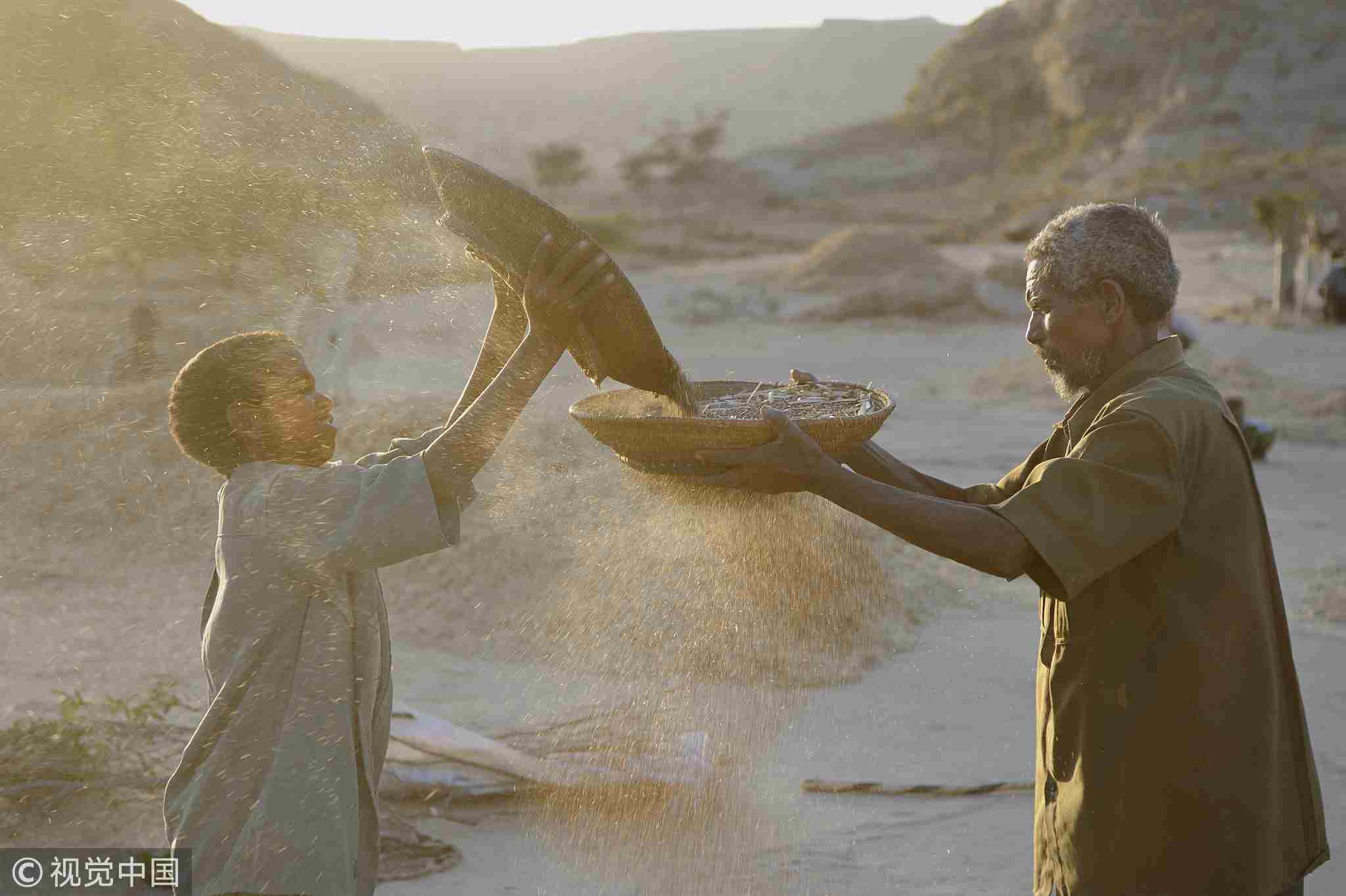
An Ethiopian father and his son are winnowing teff. /VCG Photo.
An Ethiopian father and his son are winnowing teff. /VCG Photo.
In particular, complaints are directed at the number of Chinese workers employed on an infrastructure project. Generally, 10 percent of the workforce on an African road project is Chinese. They are skilled workers.
As a practical matter, since wages have risen steadily in China, to hold down costs, generally experienced technicians and engineers with must-have skills from China are recruited for overseas projects.
China-Zambia is a model relationship in Sino-African engagement with projects that are among the most worth emulating continent-wide.
Of the Chinese lending matters in Africa I've seen, my favorite example of win-win cooperation is a loan advanced by China Development Bank to the Zambian government for the installation of thousands of solar-powered hammer mills for processing corn, with each unit run by a community cooperative.
There have been ground-level tensions even in the model bilateral relationship. Local Chinese communities must be safe so that the projects they work on can be completed. While there are inevitably cross-cultural problems between working class groups from different parts of the world in one location, both sides must constantly work together to foster a safe and comfortable climate.
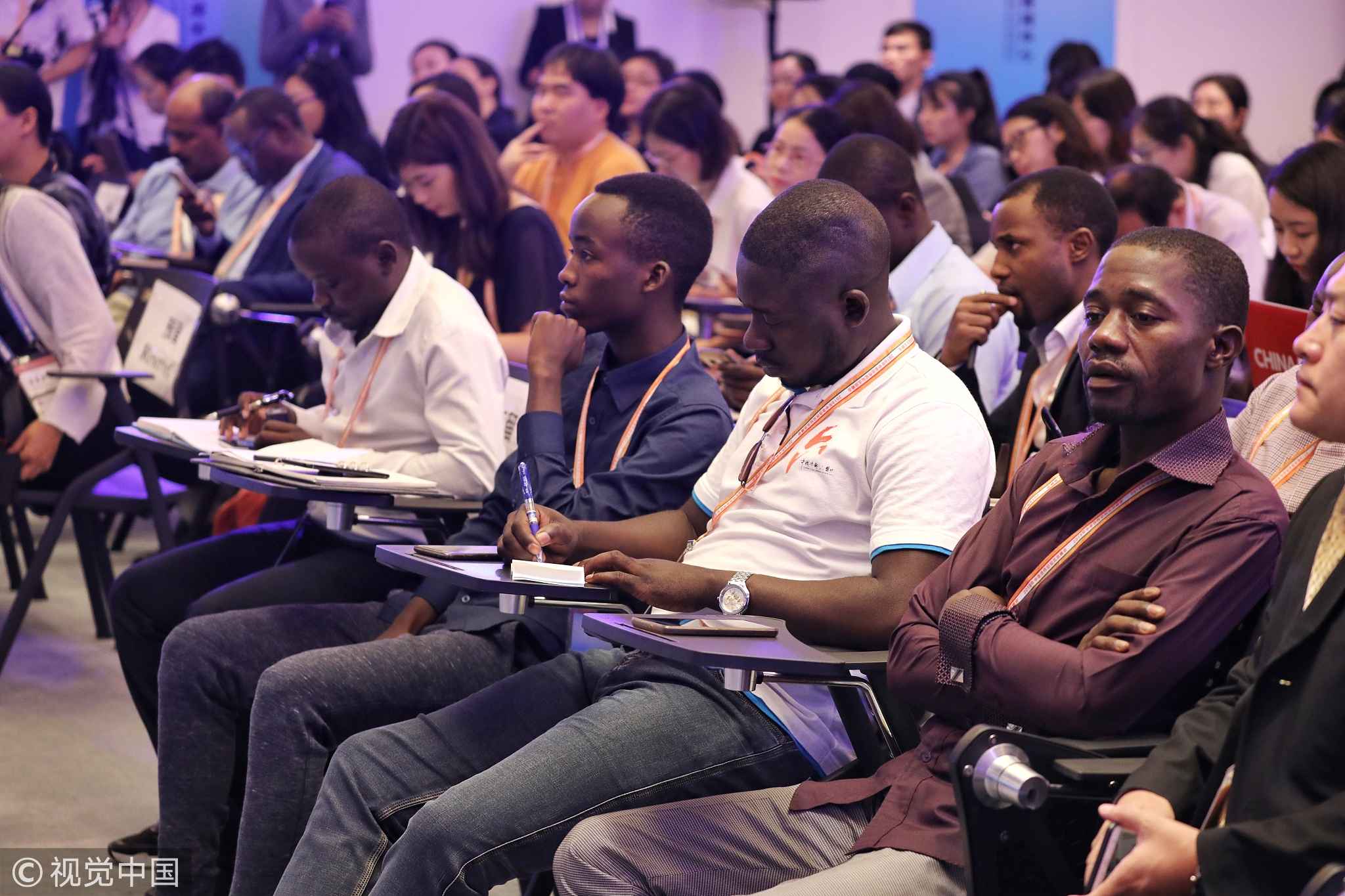
The media meeting of the 2018 Beijing Summit of the Forum on China-Africa Cooperation was held in Beijing on Sep.1, 2018. /VCG Photo.
The media meeting of the 2018 Beijing Summit of the Forum on China-Africa Cooperation was held in Beijing on Sep.1, 2018. /VCG Photo.
To FOCAC
The prosperity nexus centered on Chinese construction contractors working in Africa has enabled the rise of farmer’s incomes, better nourished and schooled children in smallholder households, and the underpinnings of economic progress that doesn't leave the rural poor behind.
If the positive trend is to robustly continue, the level of Chinese involvement in African infrastructure to a large degree depends on the plan that is announced at the upcoming summit from Sept. 3-4 for the Forum on China-Africa Cooperation.
At the last FOCAC summit in December 2015, 60 billion US dollars in lending, investment and aid was committed, with most of the allocation going to financing for infrastructure projects.
Those same resources are also in demand for the Belt and Road Initiative, a global development plan mainly integrating Eurasia, and could instead be utilized for projects outside of Africa.
For Chinese construction contractors and Africa to flourish, there must be mutual respect and restraint.
Chinese construction contractors must provide a good workplace for and transfer skills to Africans, and Africans must recognize and appreciate the work of Chinese firms and actively improve the safety climate for local Chinese communities.

SITEMAP
Copyright © 2018 CGTN. Beijing ICP prepared NO.16065310-3
Copyright © 2018 CGTN. Beijing ICP prepared NO.16065310-3